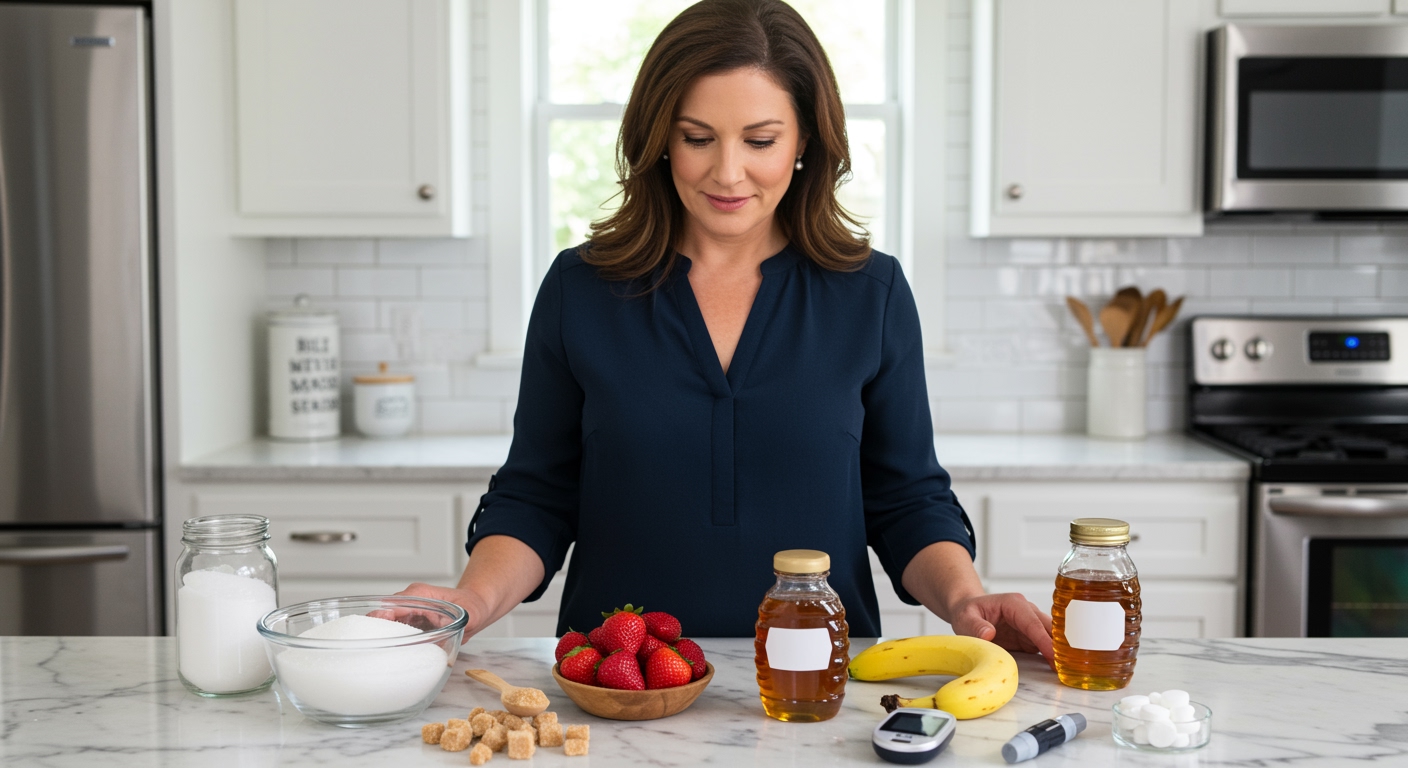✪ Key Takeaway: Sugar is not inherently bad for PCOS, but timing, type, and amount matter significantly for insulin sensitivity.
Introduction
You have been told to avoid sugar completely because you have PCOS.
This advice creates unnecessary fear and confusion about one of the most basic energy sources your body needs to function properly.
Hi, I am Abdur, your nutrition coach and today I am going to explain the real relationship between sugar and PCOS so you can make informed decisions about your diet.
What Happens When You Eat Sugar With PCOS?
Your body processes sugar the same way whether you have PCOS or not.
The difference lies in how your cells respond to the insulin that gets released when blood sugar rises.
Women with PCOS often have insulin resistance, which means their cells do not respond effectively to insulin signals.
This resistance forces your pancreas to produce more insulin to get the same job done.
Higher insulin levels then trigger your ovaries to produce more androgens like testosterone.
These elevated androgens worsen PCOS symptoms including irregular periods, acne, and unwanted hair growth.
✪ Fact: About 70% of women with PCOS have some degree of insulin resistance regardless of their weight.
Are All Sugars Created Equal For PCOS?
Different types of sugar affect your blood glucose and insulin levels in dramatically different ways.
Fructose from whole fruits comes packaged with fiber, water, and nutrients that slow down absorption.
This natural packaging prevents the rapid blood sugar spikes that trigger excessive insulin release.
Table sugar and high fructose corn syrup hit your bloodstream much faster because they lack this protective fiber.
The speed of absorption matters more than the total amount when it comes to insulin response.
Research shows that eating an apple causes a much smaller insulin spike than drinking apple juice with the same sugar content.
Your body handles natural sugars in whole foods more efficiently than processed sugars in packaged products.
✪ Pro Tip: Choose whole fruits over fruit juices to get natural sugars with built-in portion control and fiber benefits.
Does Timing Matter When Eating Sugar With PCOS?
Your insulin sensitivity changes throughout the day based on your circadian rhythm and activity levels.
Most women with PCOS have better glucose tolerance in the morning when cortisol levels are naturally higher.
This means your body can handle moderate amounts of sugar more effectively earlier in the day.
Physical activity dramatically improves your cells ability to use glucose without requiring extra insulin.
Eating sugar within 30 minutes after exercise takes advantage of this enhanced insulin sensitivity window.
Late evening sugar consumption tends to cause more problems because insulin sensitivity naturally decreases as bedtime approaches.
Combining sugar with protein or healthy fats also slows absorption and reduces insulin spikes regardless of timing.
✪ Note: A 10-minute walk after eating sugar can reduce blood glucose spikes by up to 30% in women with PCOS.
How Much Sugar Can You Have With PCOS?
There is no universal sugar limit that applies to every woman with PCOS.
Your individual tolerance depends on factors like insulin resistance severity, body composition, activity level, and genetics.
The World Health Organization recommends limiting added sugars to less than 10% of total daily calories for general health.
For a 2000 calorie diet, this equals about 50 grams or 12 teaspoons of added sugar per day.
Women with PCOS may benefit from staying closer to 5% of calories from added sugars, which equals about 25 grams daily.
Natural sugars from whole fruits and vegetables do not count toward this limit because they come with beneficial nutrients and fiber.
Focus on reducing hidden sugars in processed foods rather than eliminating all sweet foods from your life.
✪ Fact: One 12-ounce soda contains about 39 grams of added sugar, exceeding the entire daily recommendation for women with PCOS.
What About Artificial Sweeteners For PCOS?
Artificial sweeteners do not directly raise blood glucose levels, making them seem like perfect sugar substitutes for PCOS.
However, emerging research suggests some artificial sweeteners may still affect insulin sensitivity through different pathways.
These sweeteners can alter your gut bacteria composition, which plays a crucial role in glucose metabolism and inflammation.
Some studies indicate that regular artificial sweetener use may actually increase cravings for sweet foods over time.
Natural sweeteners like stevia and monk fruit appear to have fewer negative effects on gut health and insulin response.
The key is using any sweetener in moderation rather than relying on them to satisfy constant sugar cravings.
Gradually reducing overall sweetness preferences works better than simply swapping one sweetener for another.
✪ Pro Tip: Try reducing sweetener amounts by 25% each week to naturally retrain your taste buds to enjoy less sweetness.
The Bottom Line
Sugar is not the villain in your PCOS story, but it requires smarter management than for women without hormonal imbalances.
Smart sugar choices create hormonal harmony while complete restriction creates unnecessary stress and social isolation.
I would love to hear about your experiences with sugar and PCOS management in the comments below, so please share your questions or insights with our community.
References
At NutritionCrown, we use quality and credible sources to ensure our content is accurate and trustworthy. Below are the sources referenced in writing this article:
- PMC: Nutritional and Herbal Supplements in the Treatment of Polycystic Ovary Syndrome
- PCOS Nutrition: Sugar and PCOS
- Mass General Brigham: Nutrition for PCOS
- UVI Health: How Much Sugar Can You Have With PCOS





